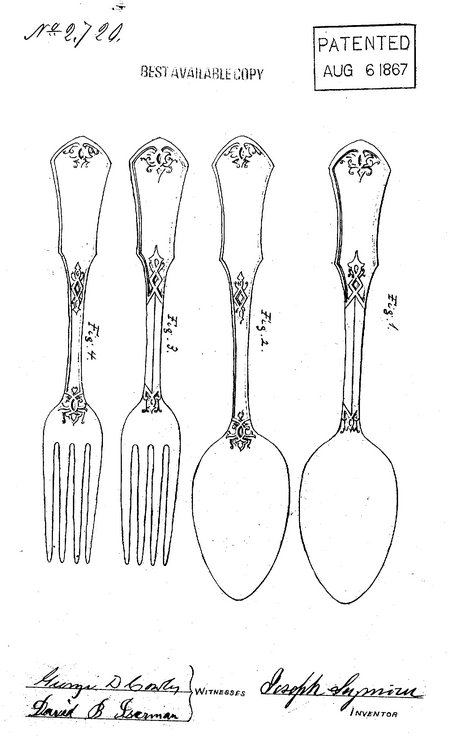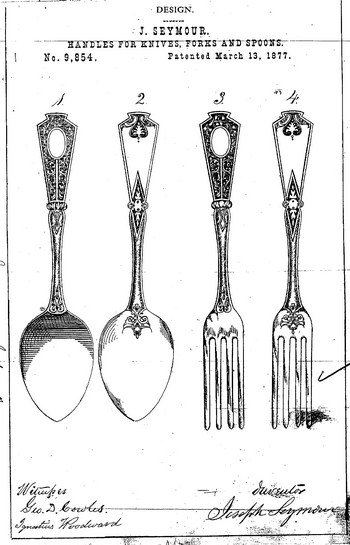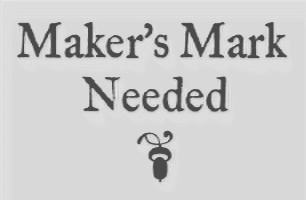|
Family Links
|
|
Spouses/Children:
Emily Mary Goodwin
|
|
|
Joseph Seymour
- Born: 17 Sep 1815, Schoharie NY
- Marriage: Emily Mary Goodwin on 19 Jan 1846 in Hartford CT
- Died: 9 Apr 1887
General notes:
Silversmith
Events in his life were:
He worked c 1835 as a silversmith in Utica NY 15
He worked from 1842 to 1849 as a silversmith in Syracuse NY
From 1846 through1849 he was employed by the firm of WILLARD & HAWLEY. 15
He was a partner from circa 1850 to 1854 with Benjamin B. Norton in Syracuse NY as NORTON & SEYMOUR. 15
He was a partner from 1854 to 1857 with Benjamin B. Norton and David Hotchkiss in Syracuse NY as NORTON, SEYMOUR & Co. 15
He worked from circa 1857 to 1870 as a silversmith in Syracuse NY as JOSEPH SEYMOUR & Co. 15

He was issued design patent number 2720 on 9 Aug 1867
JOSEPH SEYMOUR, OF SYRACUSE, NEW YORK.
DESIGN FOR A FORK OR SPOON-HANDLE,
TO ALL WHOM IT MAY CONCERN:
Be it known that I, JOSEPH SEYMOUR, of the city of Syracuse, in the county of Onondaga, and State of New York, have originated and designed a new Pattern for the Handles of Knives, Forks, Spoons, and other articles of tableware, to be known by the name of The Union, and of which the following is a full, clear, and exact description, reference being had to the accompanying drawings, making part of this specification. In the drawings
Figures 1 and 3 represent the face of the pattern, as shown on the faces of a table-spoon and fork, and
Figures 2 and 4 the reverse side of the pattern, as shown on the backs of the same articles.
In this pattern the face of the shank at the handle is bevelled off to the edge thereof, each way, from a line drawn longitudinally through its centre, the upper and lower ends of said bevelled portion terminating in an acute angle. The bevelled portion occupies about two-thirds of said shank at its centre, as shown in figs. 1 and 3. The remainder of the face of the handle is made slightly convex in the middle, and is bordered on the edge by a flat thread with a smaller half round thread just within it. Both of these threads are wrought .into a figure upon the face of the pattern at the top of the handle and at both ends of the shanks, as shown in figs. 1 and 3. Upon the reverse side of the pattern the shank of the handle is made concave, as shown in figs. 2 and 4, thereby obtaining great strength and stiffness for it with economy of material. The remainder of this side of the handle is also made slightly convex in the middle, and the whole of it is bordered with the flat thread alone, which is wrought into a figure at the top and bottom of this side of the handle, in combination with the half round thread, which on this face of the pattern is confined ^to the figures, as shown in figs. 2 and 4. There is also a figure formed of these threads at the top of the shank, as shown in the same figures.
What I claim as my invention, and desire to secure by Letters Patent, is
The design or pattern for the handles of spoons, knives, forks, and other articles of tableware, herein set forth and shown.
JOSEPH SEYMOUR.
Witnesses:
George D. Cowles, David B. Iserman.
He was a partner from 1 Jan 1870 to 1879 with Joseph Seymour, Jr. in Syracuse NY as JOSEPH SEYMOUR & SON. 10

He was issued design patent number 9,854 on 13 Mar 1877
JOSEPH SEYMOUR, OF SYRACUSE, NEW YORK.
DESIGN FOR HANDLES FOR KNIVES, FORKS, AND SPOONS.
Specification forming part of Design No. 9,854, dated March 13, 1877 ; application filed February 9, 1877.
[Term of Patent 7 years.]
To all whom it may concern:
Be it known that I, JOSEPH SEYMOUR, of the city of Syracuse, in the county of Ououdaga and State of New York, have originated a new Design or Pattern, called "The Duchess," for the Handles of Knives, Forks, Spoons, and other articles of table-ware manufactured from silver or other metal, of which the following is a full, clear, and exact description, reference being had to the accompanying drawing, making part of this specification.
In the drawing, Figures 1 and 3 represent the front of the pattern, and Figs. 2 and 4 the reverse side of the same, as shown upon a spoon and fork.
The pattern may be described as consisting of two parts, the shank and the handle, with a swell or other suitable finish where they join. The front of the shank is concave and bordered on the edges by a flat thread with a scroll or other suitable figure at the top and bottom thereof. The handle is bordered on its edges by a flat thread, and near its upper end has an oval surrounded also by a flat thread, with a similar thread running from the lower end of the oval lengthwise down the center line of the front of the handle to its junction with the shank. The surface of the oval is plain, and that of the remainder of the handle within the border is figured, the oval being surrounded by a vine bearing leaves and flowers, and between the oval and shank being filled with scroll-work.
Upon the reverse side of the pattern shown in Figs. 2 and 4 the shank is concave. The shank and handle upon this side are also bordered by a flat thread, terminating at the lower end of the shank, in an ornamental figure. The surface of this side of the pattern is plain, excepting an ornamental scroll at the upper end of the handle, and a diamond shaped figure covering the junction of the handle and shank.
What I claim as my invention, and desire to secure by Letters Patent, is
The design for the handles of knives, forks, spoons, and other articles of table-ware, as herein shown, set forth, and described.
Joseph Seymour
Witnesses:
Geo. D. Cowles
I. Woodward
He was a partner from 1879 to 1887 with Joseph, Jr and Edward G. Seymour in Syracuse NY as JOSEPH SEYMOUR & SONS. 10
He appeared on the 1880 census taken at Syracuse NY, listed as silverware manufacturer.
Joseph married Emily Mary Goodwin, daughter of Hezekiah Goodwin and Emily Pratt, on 19 Jan 1846 in Hartford CT. (Emily Mary Goodwin was born on 1 Aug 1817 in East Hartford CT.)
|


